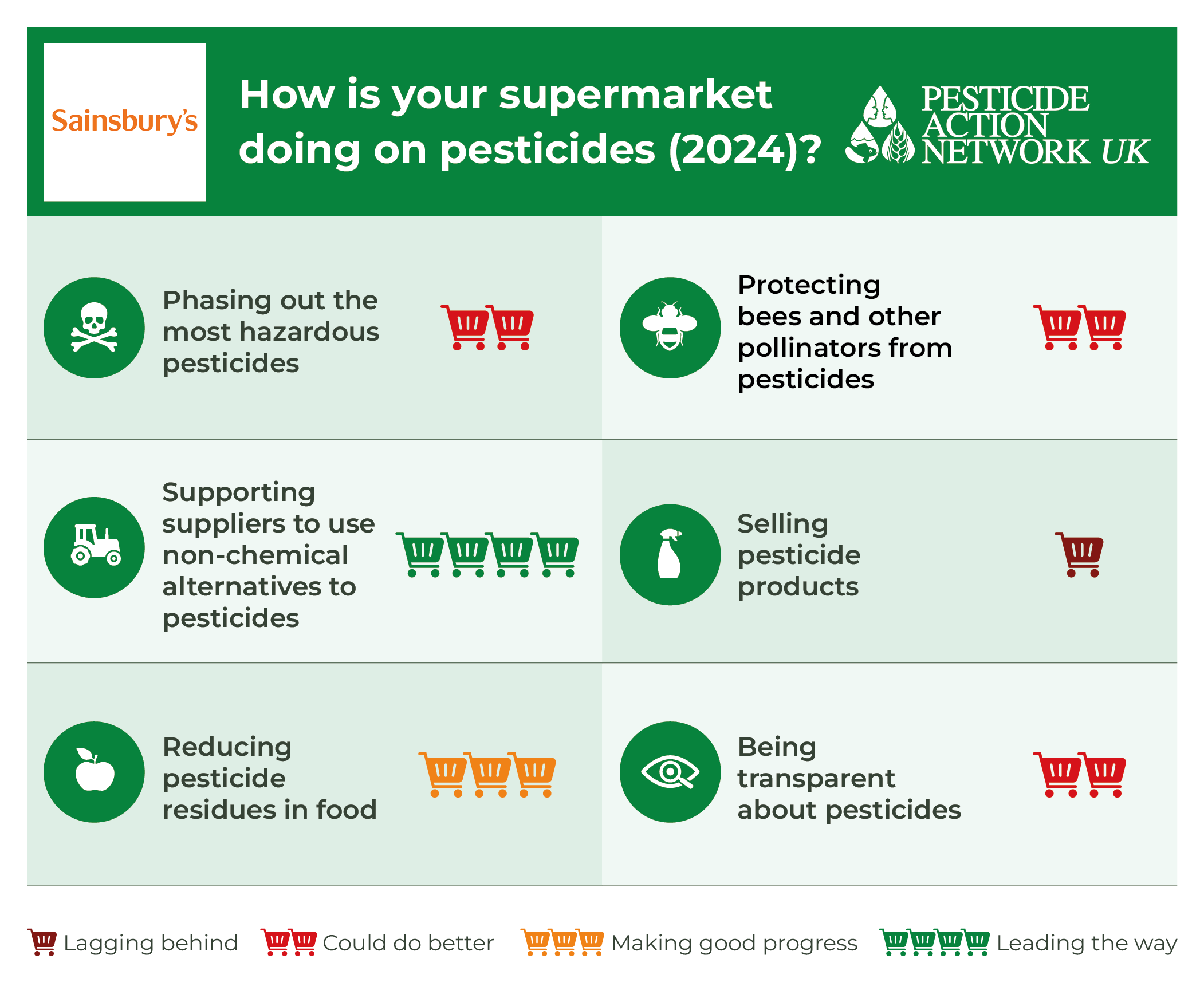Sainsbury’s
Sainsbury’s received an average overall score and came fifth out of ten supermarkets in the 2024 ranking. The company’s position has dropped by one place since the previous ranking in 2021, largely because other supermarkets have been able to demonstrate that they have moved further and faster over the past three years. While there is still more work to do, Sainsbury’s is making progress in terms of protecting the health of consumers, agricultural workers and the environment from pesticides.

What is Sainsbury’s doing well?
Phasing out Highly Hazardous Pesticides
- When Sainsbury’s bans or places restrictions on a specific pesticide due to the harms it causes, it not only applies to suppliers growing fresh fruit and vegetables but also to frozen produce and bakery products sold in-store. Most other supermarkets’ bans and restrictions only apply to fruit and vegetables. The company also uses extremely robust criteria for deciding which pesticides to ban or restrict, which are more comprehensive than those used by most other supermarkets.
- The company has managed to reduce its use of fungicides (which are designed to prevent fresh food from rotting) through the adoption of innovative approaches such as applying waxes to the outside of fruit or vegetables, using non-chemical post-harvest treatments and adopting better food storage conditions such as ensuring correct air flow and temperature.
Supporting suppliers to use non-chemical alternatives to pesticides
- Sainsbury’s provides excellent support to its suppliers to help them reduce pesticide use. It supports research and trials into non-chemical alternatives which it shares with its UK, EU and international suppliers. It also provides them with training and guidance which includes case studies on very specific topics such as reducing post-harvest pesticide use in citrus. Through its Crop Action Groups, online supplier platform and a range of other peer-to-peer structures, the company has created numerous opportunities for suppliers around the world to come together and share key learnings with each other on pesticide reduction and non-chemical alternatives.
- The company uses the results of its residue testing programme to determine which crops and suppliers to prioritise when targeting its support on pesticide reduction and adopting non-chemical alternatives. This joined up approach enables the company to better support its suppliers on pesticide reduction.
Reducing pesticide residues in food
- Sainsbury’s tests a range of food types for pesticide residues including fruit, vegetables, herbs, spices, nuts and wheat products such as bread and pasta. When this testing detects a residue that reaches two-thirds (66%) of the legal safety limit an investigation is triggered which includes working closely with the supplier to understand and tackle the problem. An investigation is also triggered if the company detects any residues at all in either baby food or organic produce.
Protecting bees and other pollinators from pesticides
- Sainsbury’s has developed a free app which enables their UK fruit and vegetable suppliers to identify areas of their farms that would be best suited to pollinators. It also works with a group of its lead suppliers within its ‘Better for the Planet ‘Initiative. These suppliers meet regularly and have regular biodiversity reporting requirements.
What are Sainsbury’s priority areas for improvement?
Phasing out Highly Hazardous Pesticides
- Sainsbury’s does not appear to be making enough progress on phasing out the use of Highly Hazardous Pesticides in its supply chains. In response to a question regarding pesticides added to the company’s prohibited list since 2022, Sainsbury’s declined to answer in full, choosing instead to give just two examples. However, the examples provided (alachlor and aldicarb) are both already banned in more than 110 countries, meaning that the company has done little more than follow national regulations. All supermarkets should be aiming for continuous improvement in terms of phasing out the most toxic pesticides and it would be good to see Sainsbury’s step up its efforts in this area.
Protecting farmworkers from pesticides
- Sainsbury’s is not doing enough to protect the health of agricultural workers using pesticides to produce food that ends up on its shelves. While it does ask its suppliers to consider “worker health and safety, welfare and incident reporting systems”, unlike some other supermarkets, the company does not require agricultural workers applying particularly toxic chemicals to adopt additional safety measures. Nor does it monitor pesticide poisonings of workers involved in its global supply chains. On health and safety issues related to pesticides, it relies largely on third-party farm assurance scheme GlobalG.A.P and external auditors and so has far less direct oversight than some other supermarkets.
Protecting bees and other pollinators from pesticides
- Sainsbury’s could be doing more to protect pollinators from pesticides. The company has restricted the use of some neonicotinoids (the insecticides notorious for driving declines in bee populations worldwide) while others remain on its so-called ‘Watch list’ which means that their use is simply monitored. Similarly, a number of other pesticides that are also classified as ‘highly bee toxic’ (such as permethrin and fipronil) also sit on the company’s Watch list. While Sainsbury’s does require its key suppliers to monitor biodiversity including pollinator populations, the company should expand this requirement so that it applies to its entire supply base.
- Pesticides are still sprayed around Sainsbury’s stores and car parks with the aim of controlling weeds. While the company is evaluating ways of managing weeds without chemicals, it told PAN UK that adoption of these approaches is on a “case-by-case basis” and that the company as a whole has no plans to go pesticide-free. To help biodiversity flourish, Sainsbury’s should phase out the use of pesticides around all its stores as soon as possible.
Selling pesticide products
- Sainsbury’s is one of just five of the top ten UK supermarkets still selling pesticides in its gardening range. It offers deals and discounts on pesticides which can lead to unused pesticides being poured down the sink or put in landfill, contaminating water and soil. It also sells pet flea treatments and biocidal products (such as ant sprays or cockroach powders) both of which contain hazardous pesticides. Despite reducing its range of pesticide products and stocking more natural alternatives, the company is very much lagging behind in this area and should stop selling all products containing Highly Hazardous Pesticides as soon as possible.
Being transparent about pesticides
- Sainsbury’s should be more transparent when it comes to pesticides. It publishes brief summaries of its pesticide policy and residue testing results for the past five years, but falls short of publishing detailed versions of either. It is one of the few supermarkets that does not publish its lists of pesticides which it bans, restricts or monitors within its global supply chain.













